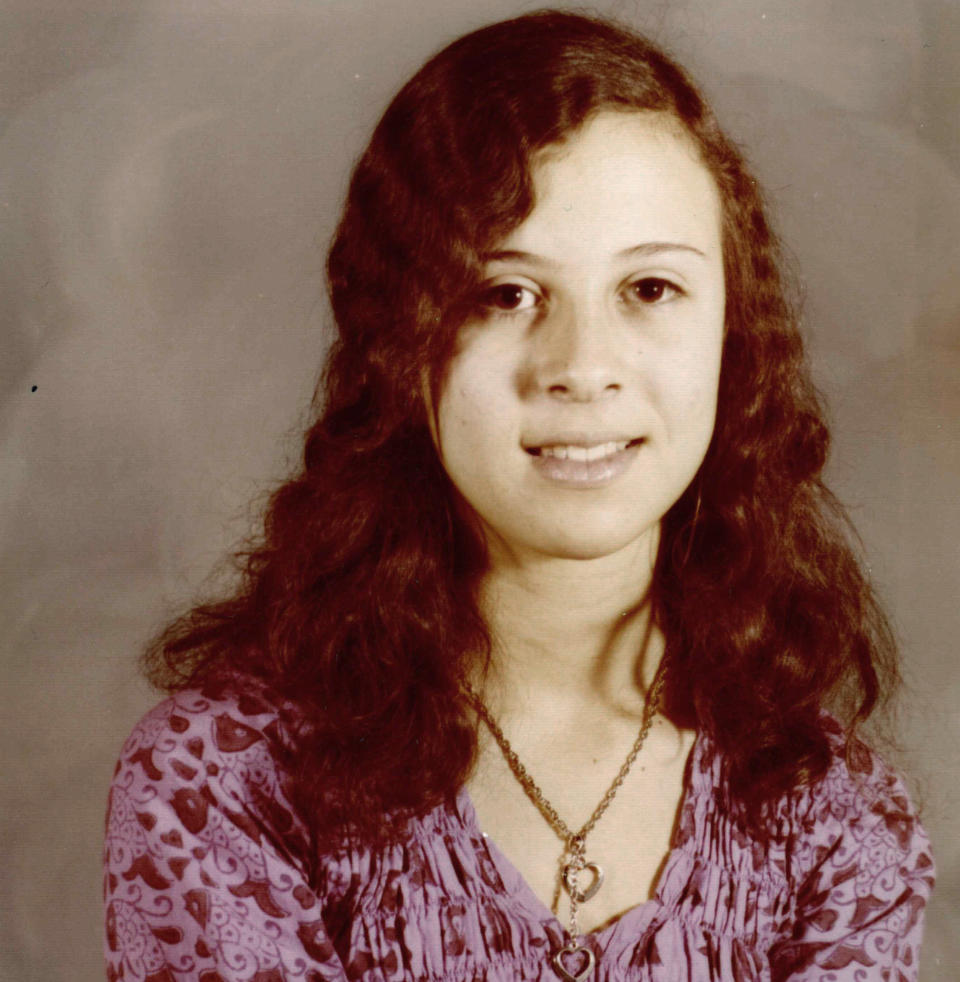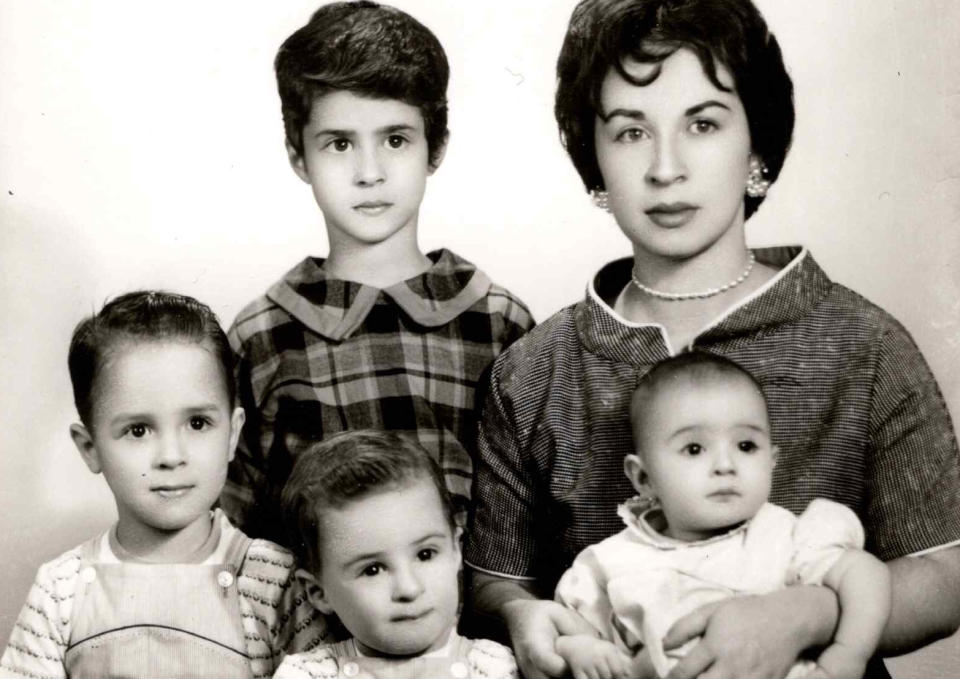Journalist Maria Hinojosa adapts her memoir for young readers
- Oops!Something went wrong.Please try again later.
Acclaimed journalist Maria Hinojosa decided to adapt her memoir for young readers after she thought about the size and scope of the U.S. Latino population.
“I was like, yeah, I don’t write for kids,” Hinojosa, 61, said. “But then you think about the ages — the median age of Latinos and Latinas in the U.S. — I have to be writing this book.”
A 2019 Pew Research Center study found that the most common age for U.S. Latinos in 2018 was 11, compared to 58 for white Americans.
“We have to get to our kids," said Hinojosa, “and definitely another story about Latinos and Latinas, another narrative."
The host of radio’s “Latino USA” recently released a new adaptation of her 2020 book, “Once I Was You,” aimed at kids ages 8 to 12. Hinojosa takes her readers on her journey from Mexico to Chicago to New York City, as she pursues her dreams and finds herself. Kirkus Reviews called it a “timely and important story skillfully adapted for young people.”

In this book, the “girl with big hair and even bigger dreams” recalls some of the seminal moments of her youth and adolescence: attending a protest with her family at age 8, which awakened her social conscience; watching “60 Minutes” and wondering why all the news anchors were white men; and seeing a character named Maria in “West Side Story” on TV and feeling like her existence was finally validated.
Although this version of Hinojosa’s story ends when she finishes college, she is candid about the feedback she received in her career. “You are too Mexican-y. Too immigrant-y. Too feminist-y. Too lefty. Too ungrateful and maybe even too unpatriotic,” were some of the criticisms she heard about her reporting style.
“I like the fact that this book has got attitude,” Hinojosa said, noting that the young generation that has lived through the Black Lives Matter movement and the pandemic is smart and self-aware. “I want them to see themselves and hopefully become journalists, at least some of them.”
The title of the original version of “Once I Was You” stems from an encounter Hinojosa had with a child who had migrated at the height of the family separations policy in 2019.
“I’m not saying I was ever a child migrant from Central America,” Hinojosa told NBC News in 2020. “But I know what it is like to be ‘the other,’ and that makes it easier to recognize ‘the other’ around you.”
Hinojosa and her family came to the U.S. from Mexico in 1962 and settled in Chicago, where her father, a doctor, was a professor.

Hinojosa — who has been a reporter at CNN, NPR and PBS — founded Futuro Media, an independent nonprofit newsroom, in 2010 to produce content from the perspective of people of color.
Reflecting on the original version of “Once I Was You,” Hinojosa said the hardest part was revisiting the experience of being raped.
“I had never written about it, I had denied it. ... But I never had to write [about] it,” she said. “That was the part where I remember just writing and crying as I wrote it.”
In that book, she also described getting two abortions.
“For me, the abortions were the right thing to do; I’m not traumatized by that,” she said. “I want people to know that if it happens to them, they’ll be OK. It’s all right; we deserve the right to choose.”
Hinojosa said she was “horrified” and “disgusted” by the Supreme Court’s decision overturning Roe v. Wade, but not surprised.
“What politicized me in the U.S. was not the issue of immigration. It was civil rights and reproductive rights,” she said. “And so, we’re going to have a next generation of young Latinos and Latinas politicized by the same things.”
A prestigious Pulitzer is a 'community win'
In May, the staffs of Futuro Media (New York) and PRX (Boston) were awarded the Pulitzer Prize in audio reporting for the podcast “Suave.” In seven parts, “Suave” examines Hinojosa’s nearly 30-year relationship with David Luis “Suave” Gonzalez, once sentenced as a juvenile to life imprisonment in Pennsylvania. It is a story about incarceration, redemption and how the simple act of sending a Christmas card set Hinojosa on a path to receiving journalism’s highest honor.
Hinojosa was shocked on the day the prizes were announced.
“I didn’t know my team had applied, had submitted for a Pulitzer” she said. “So, it was just like that kind of unexplainable shock. ... It was like, what? Did I just land on Mars? Or what happened?”
Winning the Pulitzer felt like “a real community win,” Hinojosa said, because of the support and congratulations she received from activists, incarcerated people and fellow journalists. “I saw something in this story with Suave in 1993, and I just never let go. … It’s the first time the Pulitzer has ever been awarded to a Latina-founded and -run media company. And that’s historic.”
Hinojosa’s accomplishments are noteworthy given that she has succeeded in an industry that is often challenging for Latino and Latina journalists. In a June Pew study, journalists gave the industry mixed reviews on newsroom diversity and the lowest marks on racial and ethnic diversity. Nearly half (48%) of U.S. Latino journalists said their newsrooms did not have enough racial and ethnic employee diversity.

This lack of diversity in mainstream newsrooms is a problem, said Yvette Cabrera, president of the National Association of Hispanic Journalists.
“We are in a country where nearly 1 in 5 people are Latino,” she said. “If newsrooms don’t reflect the diversity of their communities, it will be difficult to cover those communities, to understand them and to go beyond superficial stories.”
Latinos care about the environment, gun reforms and health care, Cabrera pointed out, yet that is not usually reflected in news coverage.
“When Maria created Futuro Media, she was saying, ‘I am going to put Latinos in charge and cover the community in the way it should be covered,’” she said.
Cabrera recalled hearing Hinojosa on “Latino USA” one night, years ago, and being struck by her correct pronunciation of Latino names: “It’s a small thing, but back then, very rare; I was in awe.”
As an author, entrepreneur and journalist, Hinojosa has received many honors, including a Peabody Award and multiple Emmy Awards. But she said her proudest achievement is “keeping my family together.”
“This [business] is really hard. Those of us in the media business, we have to have a lot of grit, a lot of edge, a lot of competition and a very big ego. ... But it is exhausting, and our families can pay the price of our obsession with stories or with injustice or being sad all the time,” she said. “So I think my greatest accomplishment is having my family intact, having my husband, my son and my daughter be a part of everything I do, because they love and respect the work — and I love and respect them.”
Follow NBC Latino on Facebook, Twitter and Instagram.
This article was originally published on NBCNews.com

